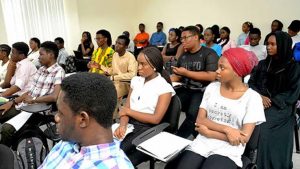TETFund Tasks Vice Chancellors To Address National Development Challenges
This news was culled from The Nigerian Tribune’s publication of July 14, 2022
The Tertiary Education Trust Fund (TETFund) has called on vice chancellors of Nigerian universities to ensure the operation of the centres of excellence created in some universities to address specific developmental challenges in Nigeria.
The board of the TETFund to had in November 2020 approved N12 billion to the University of Lagos, University of Abuja and 10 others as the “pioneer Centres of Excellence.”
The motives behind the centres of excellence are to address some specific national development challenges through the preparation of professionals, applied research and associated outreach activities to partners, especially community services.
Two centres were established in each of the six geopolitical zones.
In the North-Central, the University of Abuja and University of Jos were selected as Centres of Excellence in Public Governance and Leadership and Food security respectively, while in North-East, the Abubakar Tafawa Balewa University, Bauchi, was made the TETFund’s Centre of Excellence in food security. The University of Maiduguri had the Centre of Excellence in Arid Zone Research and Development.
The North-West had the Usman Dan Fodio University, Sokoto, as a Centre of Excellence in Urology and Nephrology and Bayero University, Kano, in Renewable Energy.
South-East had the Michael Okpara University of Agriculture, Umudike and Nnamdi Azikiwe University, Awka, as the Centre of Excellence in Root Crop Research, Development and Agriculture Transitional Studies respectively.
In the South-South, the University of Benin and University of Uyo got Centres of Excellence in Aquaculture and Food Technology and Computational Intelligence and Multi-Disciplinary Studies respectively.
Meanwhile, in the South-West, the University of Ibadan and the University of Lagos were responsible for Biodiversity Conservation and Ecosystem Management.
The executive secretary of the Tertiary Education Trust Fund (TETFund), Mr Sonny Echono, while speaking during the vice chancellors’ roundtable meeting on the implementation of the Agricultural Research and Innovation Fellowship for Africa (ARIFA) in Nigeria with the theme: ‘Building The Post-Vicosa Symposium Action Plan,’ stressed the importance of agriculture in addressing unemployment in Nigeria.
He urged the vice chancellors to deploy more energy into the actualisation of agriculture transformation, while he enjoined them to operationalise the centres of excellence as soon as possible.
“My charge to you is to make this a personal mission. I’m very confident that if we get it right in the aspect of agriculture as a country, half of our problems are solved because it is the easiest means of creating jobs,” he said.
He charged them to find modern ways of doing the things that could significantly improve revenue generation.
“Moreso, if we are able to adopt new technology, develop our mechanisation and irrigation, we will find opportunities through commercial agriculture and we will also be able to absorb the graduates who will do the production.
“More than 60 percent of those who graduated in agriculture go on to do other things with their lives simply because we don’t have the commercial farming that can absorb this workforce that we have produced,” Echono said.
He stated that Nigeria could learn a lot from Brazil through partnership, given that country’s track record in agriculture.
Speaking, the executive secretary of Agricultural Research in Africa (FARA), Dr Yemi Akinbamijo, said that the workshop was meant to have an internationalisation process, saying that the outcomes from the meeting will feed into Post-Viçosa Sympo Action Plan, holding at University of Lagos in July.
He hinted that the meeting will focus on priority areas of demand for increased capacity in STEM, establishment of innovation platforms, among others.








